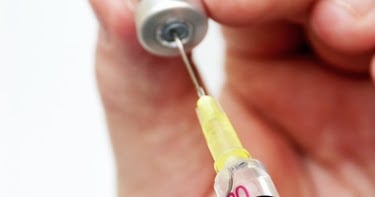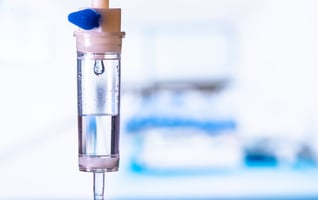An injection of the drug ketamine can produce a rapid antidepressant effect in subjects with...
Pilot Study Suggests Repeat Ketamine Infusions Safe, Effective for Older Adults With Depression

Receiving biweekly ketamine infusions for one month may reduce symptoms of depression and improve cognition in older adults who have not experienced improvements when taking at least two different types of antidepressants, suggests a report in The American Journal of Geriatric Psychiatry. The pilot study also revealed that the repeated ketamine infusions were well-tolerated by adults aged 60 years and older.
Despite evidence that treatment-resistant depression is associated with poor long-term outcomes (including cognitive dysfunction and death) in older adults, treatment options for this population are limited, wrote Hanadi Ajam Oughli, M.D., of the University of California, Los Angeles, and colleagues. A previous study, described in The American Journal of Psychiatry, found that adults with treatment-resistant depression (mean age of 44 years) who received ketamine intravenously two or three times a week for four weeks experienced sustained improvements in depression symptoms.
For the pilot study, the researchers included 25 adults (mean age 71.5 years) with treatment-resistant depression from five U.S. sites. For the acute phase, the participants received ketamine IV (0.5 mg/kg of body weight) over 40 minutes twice weekly for four weeks. At the end of the acute phase, those who achieved Montgomery-Åsberg Depression Scale (MADRS) total score of less than 10 or at least a 30% reduction from baseline MADRS total score were invited to participate in a continuation phase. This phase consisted of an additional four weeks of one ketamine infusion per week.
The researchers monitored the participants’ dissociation and vital signs during the ketamine infusion sessions; they also assessed symptoms of craving and depression as well as cognitive performance at baseline, the acute phase, and the end of the continuation phase.
Of the 25 participants who started the study, 22 (88%) completed the acute phase of the trial, and 15 (60%) experienced 30% or greater reduction in MADRS and entered and completed the four-week continuation phase of the trial. The mean change in MADRS total score between baseline and the end of acute phase was a decrease of 9.4 points. For those who participated in the continuation phase, the mean change in MADRS total score between the start and end of the continuation phase was an increase of 3.5 points. At the end of the acute phase, 48% met the criteria for response (defined as 50% reduction in baseline MADRS total score) and 24% for remission (defined as a MADRS score of less than 10). At the end of the continuation phase, 47% met criteria for response and 27% for remission.
Twenty-three participants completed computerized cognitive assessments (NIH Toolbox Cognition Battery). During the acute phase, the participants experienced improvements in executive function; for those individuals who also participated in the continuation phase of the trial, the improvements in executive function were sustained for four weeks. Additionally, side effects were mostly limited to infusion-related transient hypertension, nausea, vomiting, headache, and dissociative symptoms (which peaked at about 40 minutes and resolved within 90 minutes after infusions).
“Taken together, these preliminary results support that IV ketamine is a promising treatment for [treatment-resistant depression] in older adults and is associated with improvement in [executive function], at least in the short term. This is important given the paucity of research and the limited, evidence-based treatment options for [treatment-resistant depression] in older adults.”
For related information, see the American Journal of Psychiatry article “A Double-Blind, Randomized, Placebo-Controlled, Dose-Frequency Study of Intravenous Ketamine in Patients With Treatment-Resistant Depression.”
(Image: iStock/georgeoprea9)
Don't miss out! To learn about newly posted articles in Psychiatric News, please sign up here.






